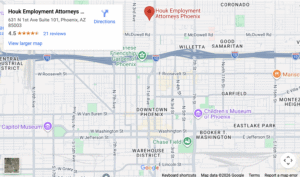
The rules about workplace discrimination under Title VII of the Civil Rights Act can shift when courts interpret them differently. The Muldrow decision is a recent legal development that may change how employees and employers approach claims of discrimination. If you work in Arizona (or any other state), understanding what Muldrow says—and how it might affect Title VII cases—can help you know your rights if you suspect unfair treatment.
What Does Title VII Cover?
Before looking at Muldrow, it’s helpful to recall what Title VII does. Title VII of the Civil Rights Act protects employees from discrimination at work based on:
- Race
- Color
- Religion
- Sex (including gender identity and sexual orientation)
- National origin
This protection applies to many aspects of a job, such as hiring, firing, promotions, pay, and work conditions. If your employer treats you differently for one of these reasons, you may have a valid Title VII claim.
Why Muldrow Matters
Muldrow isn’t just another case. It touched on how courts decide if an employer’s action is “materially adverse”—in other words, serious enough to count as illegal discrimination. Some lawsuits end up dismissed because the changes at work (like a shift in duties or a small demotion) don’t look “bad” enough.
Muldrow, a case decided in 2024 by the Supreme Court of the United States, raised questions about how big the harm must be for a lawsuit to move forward under Title VII. The Court held that Title VII bars employers from discriminating in important employment decisions without mandating that employees show the decision caused a “significant” disadvantage.
Potential Changes for Employees
After Muldrow, some employees may find it simpler to argue that negative shifts at work violate Title VII. If you experience a change in duties, a schedule adjustment that hurts your career path, or a demotion in title—even if your pay stays the same—you might have a stronger argument that you were targeted for an unlawful reason. The outcome can depend on how courts in Arizona and beyond interpret Muldrow’s reasoning.
Potential Changes for Employers
Muldrow also matters to employers. Companies may have to pay closer attention when they shuffle tasks, reassign roles, or issue small disciplinary measures because such actions could be seen as “material” under Title VII. Employers might also need more thorough documentation showing that a change had a valid, nondiscriminatory reason. If they fail to justify it, they might face bigger legal risks.
Practical Tips for Workers and Employers
Keep in mind the following tips in light of the Muldrow decision:
- For employees: If you suspect discrimination, keep records of all changes at work—duties, shifts, pay, or even job titles. Write down dates, who made the decision, and any comments that suggest bias.
- For employers: Maintain clear, objective policies for promotions, discipline, and job reassignments. Document the reasons for these actions. That way, if someone files a claim, you can show a legitimate basis for your decisions.
Getting legal advice early on could also be a big help for you as you move forward with these recent changes in mind.
Contact an Experienced Phoenix Employment Lawyer for Help
The Muldrow case could expand how Title VII views adverse actions at work, but much depends on how courts interpret and apply its findings. In any event, the key lesson is that discrimination claims might become more viable even when changes at work don’t involve major pay cuts or outright termination.
Both employees and employers in Arizona and elsewhere should watch for new rulings that build on Muldrow’s take on what counts as a “material” adverse employment action. If you’re unsure about how this affects your situation, consider talking with an employment law attorney for up-to-date advice.
For more information, please contact our employment law firm is conveniently located near you. We have an office in Phoenix, AZ.
Houk Employment Attorneys
631 N 1st Ave Suite 101, Phoenix, AZ 85003
(480) 569-2377

